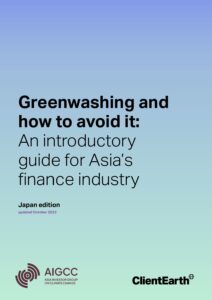This financial sector guidance helps banks and institutional investors operating in Japan and Asia to guard against greenwashing.
As the financial risks of climate change increase and interest in transition finance grows, combating greenwashing is high on the regulatory and investor agenda in Japan and globally, including the need to navigate greenwashing risks. This special Japan edition focuses on:
- Identifying what greenwashing entails** and the associated risks for financial institutions operating in Asia;
- Emerging forms of greenwashing and an analysis of regulatory and legal responses so far; and
- Recommendations for financial institutions operating in Japan and other Asian countries to guard against greenwashing risks, together with case studies on best practices from investors operating in Asia.

Read the report

報告書を読む
The report presents regulatory and voluntary measures that have been introduced around the world to combat greenwashing. The report puts a particular focus on Japan, which has taken several key steps to address the issue of greenwashing in the financial sector, as exemplified by:
- Enhanced sustainability-related disclosure requirements, as outlined on p.9 of the Guide. For example, the Sustainability Standards Board of Japan (SSBJ) announced that, by 31 March 2025, it will issue the Japanese equivalent of the International Sustainability Standards Board’s IFRS S1 and IFRS S2. This is expected to strengthen Japan’s disclosure standards.
- New guidelines have also been announced relating to product and fund labelling (p.11 of the Guide) in response to concerns over greenwashing of these investment products.
- Rules have been put in place to harmonise or guide comparisons between companies’ performance on ESG factors (p.12 of the Guide).
Greenwashing has the potential to significantly impede the green transition, risking distorting the financial markets and undermining the effective allocation of capital. While civil society has been key to identifying and prosecuting greenwashing, regulators are also increasing their scrutiny of this issue, as indicated by the report’s Forewords, written by members of Japan’s Financial Services Agency and the Singapore Exchange.
Supporting Quotes
Anjali Viswamohanan, Director of Policy, AIGCC, said: “The recommendations in the report present financial institutions operating in the ESG or net zero investing space with practical guidance on how to guard against greenwashing risks. Additionally, AIGCC also provides investors with net zero frameworks and initiatives with accountability and transparency built in, for example, the Investor Climate Action Plans (ICAPs) and the Net Zero Investment Framework (NZIF).
“We have seen Japanese investors, such as signatories to the Net Zero Asset Managers initiative (NZAM) already using the ICAPs to demonstrate their progress. These tools and frameworks get to granularity and can be useful for investors in addressing greenwashing concerns.
“Company engagement and assessments are key tools to tackle greenwashing related risks. AIGCC provides investors with tools and guidelines to ensure meaningful engagement and the guide helpfully makes reference to these as well.”
Hana Heineken, Lawyer at ClientEarth, who moderated the panel discussion during the launch event added, “The launch of the Japan edition of the guide is timely given recent notable developments in the finance market in Japan to combat greenwashing.
“Regulators in Japan and elsewhere are rightly increasing their scrutiny of this dangerous practice, which distorts the financial markets and undermines the allocation of capital to the necessary green transition. The risk of legal claims being initiated against institutions in Asia by regulators, civil society and private actors is significantly increasing, including for transition finance – which aims to support the progressive decarbonisation pathways of carbon intensive entities and their activities.
“Investors and regulators must be particularly careful in navigating the risk of transition-washing, which could derail the achievement of net zero emissions. We hope that the five pillars to guard against greenwashing in this guide will enable companies to take effective climate action and safeguard their interests against legal and commercial risks.”
Launch Event on 4 October 2023
The guide was launched during a side event of the PRI in Person 2023 conference in Tokyo, Japan. The launch event featured a distinguished panel of speakers:
- Mr Satoshi Ikeda, Chief Sustainable Finance Officer, Financial Services Agency of Japan;
- Mr Shinsuke Kobayashi, Lawyer from Kanagawa International Law Office;
- Ms Emi Onozuka, CEO of Eminent Group Ltd and member of the FSA Expert Panel on Sustainable Finance; and
- Ms Kahori Miyake, ESG Strategy and Solution Department Executive Manager, Sumitomo Mitsui Trust Bank and Co-Chair of the Japan Climate Leaders’ Partnership.
- The panel was moderated by Ms Hana Heineken, Lawyer from ClientEarth.